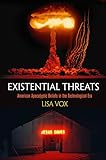Existential Threats : American Apocalyptic Beliefs in the Technological Era / Lisa Vox.
Material type: TextPublisher: Philadelphia : University of Pennsylvania Press, [2017]Copyright date: ©2017Description: 1 online resource (288 p.)Content type:
TextPublisher: Philadelphia : University of Pennsylvania Press, [2017]Copyright date: ©2017Description: 1 online resource (288 p.)Content type: - 9780812249194
- 9780812294019
- Americans -- Attitudes -- History -- 20th century
- Christianity and culture -- United States -- History -- 20th century
- End of the world -- Forecasting
- End of the world
- Eschatology -- Forecasting
- Eschatology
- American History
- American Studies
- Religion
- Religious Studies
- HISTORY / United States / 20th Century
- 306.0973 23
- BT877 .V69 2017eb
- online - DeGruyter
- Issued also in print.
| Item type | Current library | Call number | URL | Status | Notes | Barcode | |
|---|---|---|---|---|---|---|---|
 eBook
eBook
|
Biblioteca "Angelicum" Pont. Univ. S.Tommaso d'Aquino Nuvola online | online - DeGruyter (Browse shelf(Opens below)) | Online access | Not for loan (Accesso limitato) | Accesso per gli utenti autorizzati / Access for authorized users | (dgr)9780812294019 |
Frontmatter -- Contents -- Preface -- Chapter 1. Secularizing the Apocalypse -- Chapter 2. Race, Technology, and the Apocalypse -- Chapter 3. Postnuclear Fantasies -- Chapter 4. Spaceship Earth -- Chapter 5. The Politics of Science and Religion -- Chapter 6. Postapocalyptic American Identity -- Chapter 7. Post-9/ 11 Despair -- Notes -- Selected Bibliography -- Index -- Acknowledgments
restricted access online access with authorization star
http://purl.org/coar/access_right/c_16ec
Americans have long been enthralled by visions of the apocalypse. Will the world end through nuclear war, environmental degradation, and declining biodiversity? Or, perhaps, through the second coming of Christ, rapture of the faithful, and arrival of the Antichrist-a set of beliefs known as dispensationalist premillennialism? These seemingly competing apocalyptic fantasies are not as dissimilar as we might think. In fact, Lisa Vox argues, although these secular and religious visions of the end of the world developed independently, they have converged to create the landscape of our current apocalyptic imagination.In Existential Threats, Vox assembles a wide range of media-science fiction movies, biblical tractates, rapture fiction-to develop a critical history of the apocalyptic imagination from the late 1800s to the present. Apocalypticism was once solely a religious ideology, Vox contends, which has secularized in response to increasing technological and political threats to American safety. Vox reads texts ranging from Christianity Today articles on ecology and the atomic bomb to Dr. Strangelove, and from Mary Shelley's The Last Man to the Left Behind series by Tim LaHaye and Jerry B. Jenkins, demonstrating along the way that conservative evangelicals have not been as resistant to science as popularly believed and that scientists and science writers have unwittingly reproduced evangelical eschatological themes and scenarios in their own works. Existential Threats argues that American apocalypticism reflects and propagates our ongoing debates over the authority of science, the place of religion, uses of technology, and America's evolving role in global politics.
Issued also in print.
Mode of access: Internet via World Wide Web.
In English.
Description based on online resource; title from PDF title page (publisher's Web site, viewed 26. Aug 2020)


